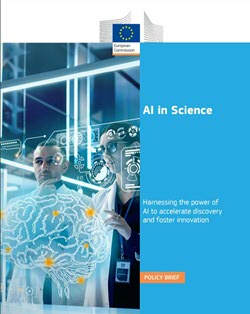EC Policy Brief: 'Harnessing the potential of AI in science to accelerate discovery and foster innovation'

Today, the Directorate-General for Research and Innovation of the European Commission published a policy brief on the role and potential of artificial intelligence (AI) in science and innovation.
AI is transforming the scientific landscape at every stage in research. It opens new possibilities, enabling scientists to accelerate the pace of discovery, solve complex problems, and address global challenges.
This document advocates a tailored European Research Area policy to speed up and facilitate the adoption of AI in science, to harnessing the potential of the technology to accelerate breakthroughs, foster innovation and drive economic growth. It builds on existing European R&I and AI policies – most notably the AI Act which is currently discussed by the European Parliament and the Council –and suggests how to translate its transformative potential into reality for science.
Iliana Ivanova, Commissioner for Innovation, Research, Culture, Education and Youth, said:
“Augmented by the transformative power of artificial intelligence, Europe’s robust scientific base and exceptional talent creates a unique asset. Leadership in AI-powered science will translate into leadership in discovery and innovation, which is essential for Europe’s competitive edge, prosperity, and technological sovereignty. Together with our partners, we need to take a responsible, trustworthy approach, so we build and maintain public trust for enduring success.”
Areas for action
The policy brief highlights the following areas for action:
- reducing barriers to adoption of AI in science,
- strengthening the data and compute ecosystem for AI in science,
- identifying strategic R&I investments for the integration of AI in science
- monitoring the impact of AI on research careers,
- addressing AI-related ethical challenges in science.
- communicating, monitoring and evaluation actions to preserve public trust in AI-driven science.
More information
For background and more information, see the original news artiicle published on the website of the European Commission.
| Last modified: | 15 December 2023 11.03 a.m. |
More news
-
24 March 2025
UG 28th in World's Most International Universities 2025 rankings
The University of Groningen has been ranked 28th in the World's Most International Universities 2025 by Times Higher Education. With this, the UG leaves behind institutions such as MIT and Harvard. The 28th place marks an increase of five places: in...
-
05 March 2025
Women in Science
The UG celebrates International Women’s Day with a special photo series: Women in Science.
-
16 December 2024
Jouke de Vries: ‘The University will have to be flexible’
2024 was a festive year for the University of Groningen. In this podcast, Jouke de Vries, the chair of the Executive Board, looks back.

